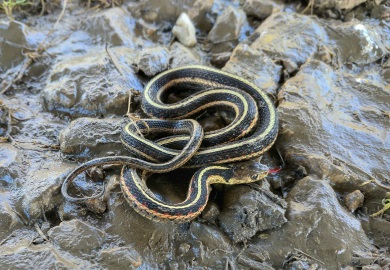April 24, 2019

Common garter snake enjoying warm day. (USFWS)
Spring is the time of year we all look forward to. The cold winter is behind us and we can spend more time outside in the bright, warm sunshine. But we aren’t the only ones enjoying the change in the weather.
During this time of the year, many wildlife species begin to emerge from their overwintering habitats, and snakes are no exception.
To some of us, this is exciting, and we can start observing these fascinating and cryptic creatures. For others, its terrifying.
So, what should you do if you find a snake? Leave it alone and enjoy it from a safe distance.
Like most wild animals, snakes have a natural fear of humans. The saying, “they are more afraid of you than you are of them,” is 100% true for snakes and they will do their best to avoid interactions with humans.
To a snake, humans are one of numerous predators they will encounter. Like any wild animal, if a snake feels threatened, it will defend itself. This shouldn't be confused with showing aggression though. If the snake is left alone, it will eventually leave.
Many of our common harmless snakes are confused with and misidentified as venomous ones. In fact, South Carolina has 38 species of snake, only six of which are venomous. It is much more common for people to see a harmless nonvenomous species than one that is potentially dangerous. Snakes like Eastern Garter Snakes, Ringneck Snakes, Brown Snakes, red-bellied snakes, Rat Snakes, and Corn Snakes can be quite common around homes, and species like the Eastern Kingsnake and Black Racer will actually kill and eat other snakes, including venomous species! You can click here to read more about common snakes found in the state.
So, the next time you see a snake, give it some space and appreciate it as one of the many incredible wildlife species we have in South Carolina and for the important role it plays in our ecosystems.



